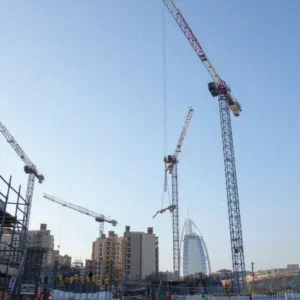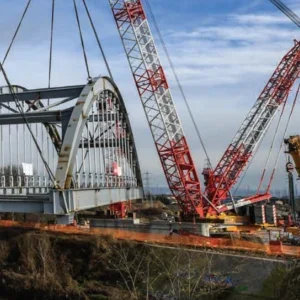It sounds a distinctly unattractive business, running a crane hire company in France. The demand for cranes is reasonable enough, so there is work to be had. The problem is the fiscal regime.
Christian-Jacques Vernazza is founder, president and 90% owner of Mediaco, France’s biggest crane rental company.
Vernazza explains the regime that he and his French competitors must endure: “The charges we face are more than other European countries. We are not treated equally as Europeans. We have the Euro but we do not have harmonisation of social and fiscal policies.” Firstly, he says, there is the tax on investment that he must pay. Only in France, he says, does a company have to pay 3.5% tax every year on investments. That means that he has to give the government 3.5% of the purchase price of every crane Mediaco has, so over 10 years he has had to pay a third of what he paid for the crane to the government, even if the crane is sitting idle in the yard. If he keeps the crane for 30 years, he has paid for it twice over. “It’s a complete nonsense,” he says.
And another thing, Vernazza rails. If you sell a crane, you have to pay 40% gains tax. In other European Union countries, he says, if you reinvest the money realised from such a sale by buying another crane, you do not face such charges.
“And now we have the 35 hours problem, which again is a complete nonsense,” he continues, referring to legislation that came into force this year stipulating that workers do not have to work more than 35 hours a week. It means that employee costs have gone up and turnover down. A British or a German worker is expected to put in at least 200 hours a year more than a French worker, he says.
“And fuel has gone up 39% this year,” he adds.
This seemingly endless litany of complaints would seem like mere moaning from a man who owns four times as many cranes – about 400 – as his next biggest domestic rivals. The average French crane fleet is just 10 machines. Why should we sympathise with a man who is so evidently successful despite such adversities? The nub of the issue is international competition that has grown since the development of the European Union, the whole concept of which is to enable all the companies of member states to compete on an even footing. The only impact it has had on the crane industry in France so far, he says, is to drive rental rates down every year because of international competition.
While British crane companies may complain about the imposition of European regulations, Vernazza wants more European interference – either to lift some of the burdens he faces or at the very least to impose similar burdens on his international competitors. If French companies face significantly greater financial burdens than their Belgian, Dutch, German or Spanish neighbours, quite simply they will not survive.
There appear to be only two solutions: either register the business in another European country, Belgium or Luxembourg perhaps, or lease equipment from companies outside France rather than purchase it. Were the latter course of action selected, the equipment would have to be sent back every six months and new leases signed, in order to avoid it counting as an asset and so being liable for tax. Vernazza recognises these options but it is a prospect that he does not want to countenance – not yet, at least.






